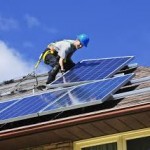 SOLAR PANELS AND BUYERS: WHAT YOU NEED TO KNOW
SOLAR PANELS AND BUYERS: WHAT YOU NEED TO KNOW
Buying and selling a home with solar powered electricity is becoming more and more common these days. As a buyer you should be aware of some pitfalls. As a seller you should know how it affects the sale of your home. Either way, understand that solar power is something that will be more and more common as we move closer to being more environmentally conscious.
SAVE LOTS OF MONEY
Schools
There is no doubt that solar power can save you money. Local San Jose high schools like Leigh, Branham, Leland, and Pioneer have all converted to solar power. The solar arrays in the parking lot do more than just provide shade to the cars below, they save the school millions of dollars in electrical expenses. The Campbell Union High School District was paying an electric bill of $900,000/yr and now pay $135,000/yr ($765,000 savings per year).
State and Federal Credits and Rebates
The state of California with the partnership of PG&E and other utility companies started the CSI (California Solar Initiative) which was a solar rebate program to spur interest in solar panel installation. The program was so popular that they ran out of funds.
The federal government still offers a 30% percent federal tax credit for the purchase (not for a lease) of a solar power system on a residential home. This is a tax credit that reduces the taxes owed. So if you purchase a $25,000 solar system, the credit would be $7,500.
The savings are there. The incentives are there. However, the solar powered system can be tricky when you are dealing with buying or selling a home with leased solar panels.
SELLING WITH STRINGS ATTACHED
Features and Benefits
Now lets discuss the buyer’s reaction to buying a home with solar power. Most buyers will look at this as a positive feature of the home and a benefit to them. They know that when they buy the home they will save money and feel good about being green.
Also, the idea of running their electricity without worrying about the electrical bill is nice for someone on a budget. For example, you might enjoy having your air conditioning unit on every day of the summer without paying extra.
Take Over the Lease
What happens if the buyer discovers that the seller actually leased the solar system and they need to agree to take over the lease? This now becomes a condition of the home purchase. The seller can’t just go up on the roof and remove the panels and say “all done.” This is when most buyers get worried.
I showed a home in Blossom valley that had this “take over lease” stipulation. The new buyer would have to take over the lease. The new buyer was asked to apply for the lease and get pre-approved. The solar company was prepared to run credit on the new buyer to make sure that they can qualify for the lease. My buyers liked the home but hated the idea of a long term lease. Especially when they never agreed to it, the seller did.
If you’re faced with the possibility of buying a home with a solar lease, you may feel the same way. The first question is how much is the lease payment? The next question is how many months are left on the lease? The buyer may discover that the seller has 20 years left on the lease. This is a huge turn off for many buyers.
BUYERS CAN’T GET A LOAN
Borrowing Money Got Harder
Fannie Mae has just released their new guidelines on homes with solar panels. The main thing that stands out in my mind is that the lease payments will now be factored into the buyer’s Debt To Income ratio.
Accepting a home with a long term lease is one thing, but having the lease payment count against you is another. If the buyer is at 42% on their debt to income ratio and now the home that they want to purchase has a lease payment of $200/mo, they may not get the loan. The lease payment may end up killing the deal.
Disclose Your Solar Lease Upfront
This can be a huge waste of time for the seller, buyer, agents, loan officers, and all others involved in the transaction. It’s important for the seller to disclose this information upfront even before anyone makes an offer. In fact, it should be on the flyer.
OTHER FACTORS
General Liability Insurance
Another Fannie Mae guideline is that the owner of the solar panels must have a general liability insurance policy that covers damage to the mortgaged property caused by faulty installation, malfunction, or other manufacturing defects, whether or not covered by the warranty.
Lien on the Property
With a solar lease there is a good chance that the solar company has a lien on the home. This lien has to be addressed when you sell the home. The lien can be removed once the owner of the home completes the lease and purchases the panels.
Buyout the Lease
One of the best options that a seller can do is to find out what the lease buyout is. The solar company can provide the cost breakdown in the event of a sale. A good option is for a seller to pay off the solar lease and hand over the solar power system to the buyer free and clear. No payments and no worries on the lease payments counting against the buyer.
But then again, in this fast-paced real estate market (like in San Jose, CA) with multiple offers, you may be able to easily find buyers who will assume the lease with no issue at all.